Letters of reprimand are usually followed by further disciplinary action and, in severe cases, termination. An employee’s performance problem can be well documented by a letter of reprimand. These letters precisely and directly state the issues and consequences the employee must resolve. However, it is essential to remain professional when writing one to inform the employee of his misbehavior and negative traits at the workplace.
Simply put, it is defined as;
A letter of reprimand is a letter usually issued by management to explain a performance problem that needs improvement.
The purpose of the letter is to ensure that the reprimand does not blindside the employee. As a logical and expected extension of progressive discipline, it should benefit the employee by helping him/her improve. This letter is typically followed by counseling and coaching by the manager, carefully documented to secure one’s position if there is a lawsuit.
Its importance lies in its use as a tool to increase the performance of employees. It is a warning to improve their performance; if erring employees continue in their ways, they will face more drastic repercussions, and in some cases, they may lose their jobs.
Free Letter of Reprimand Templates
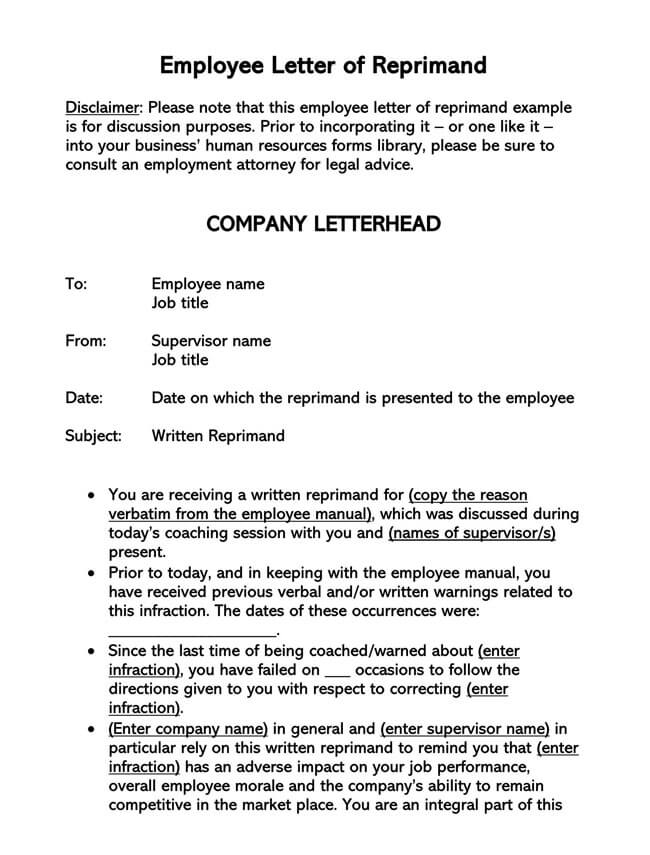
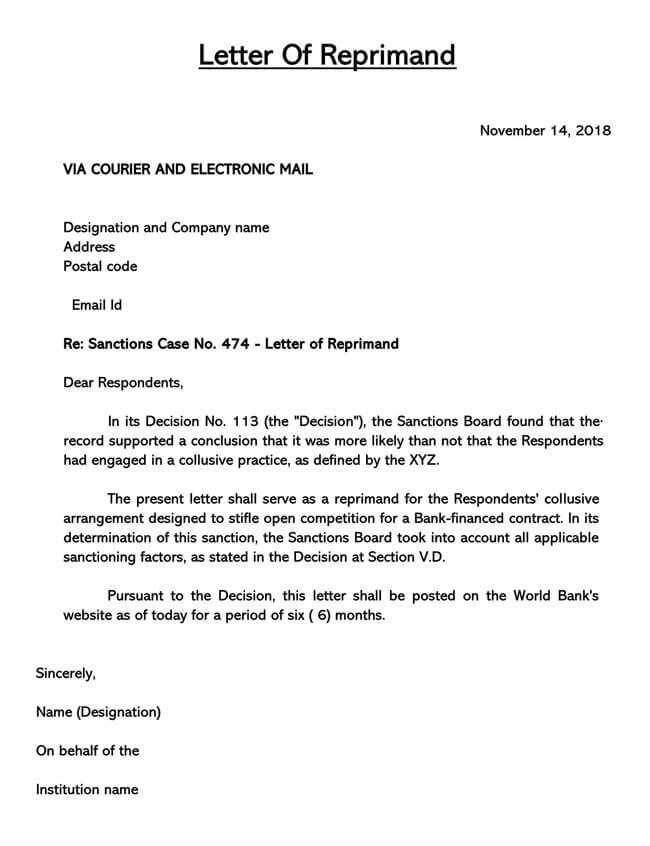
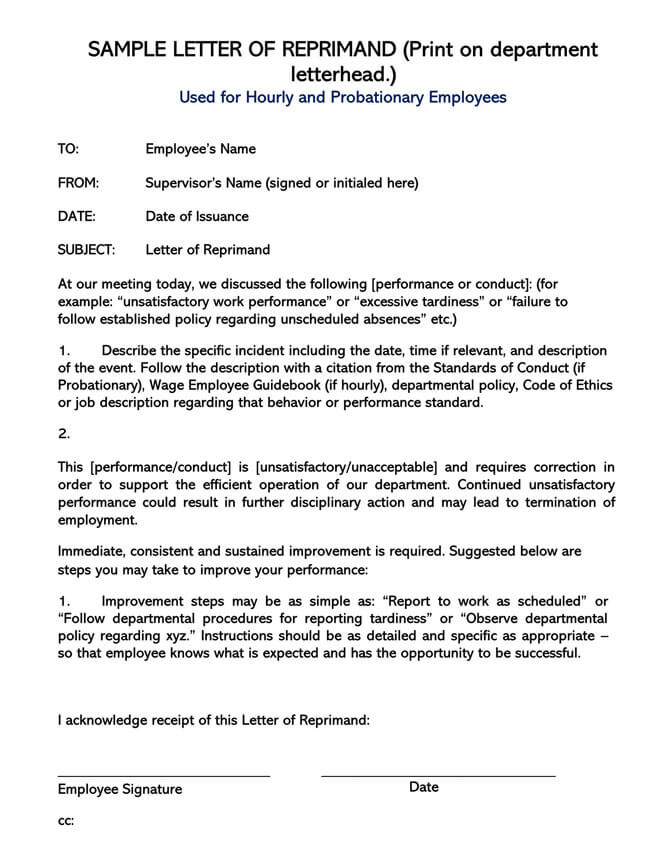
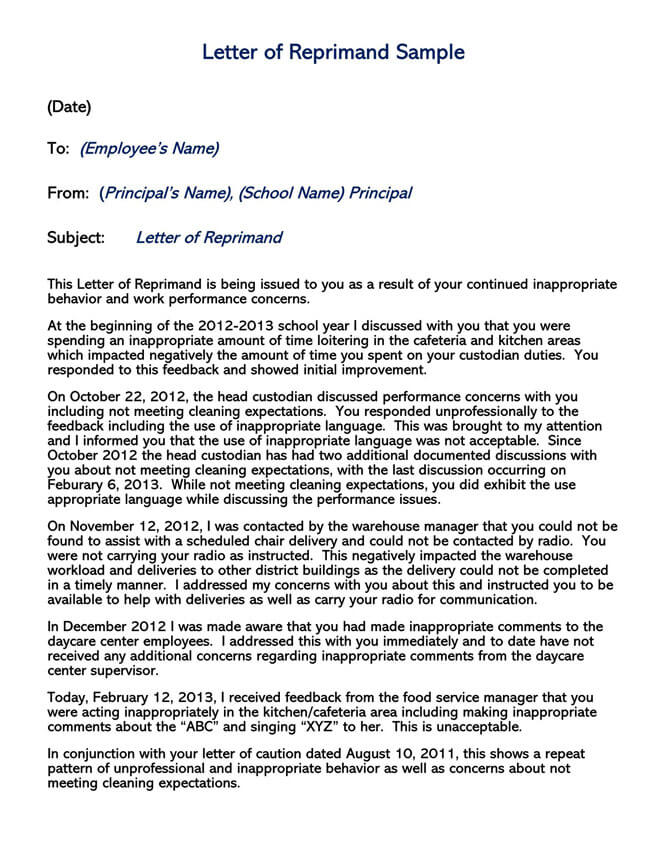
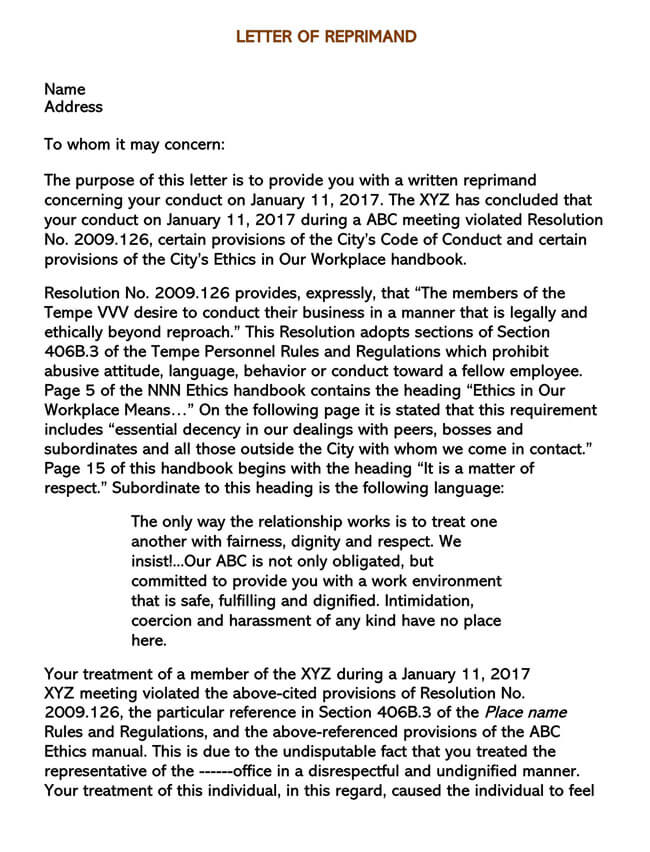

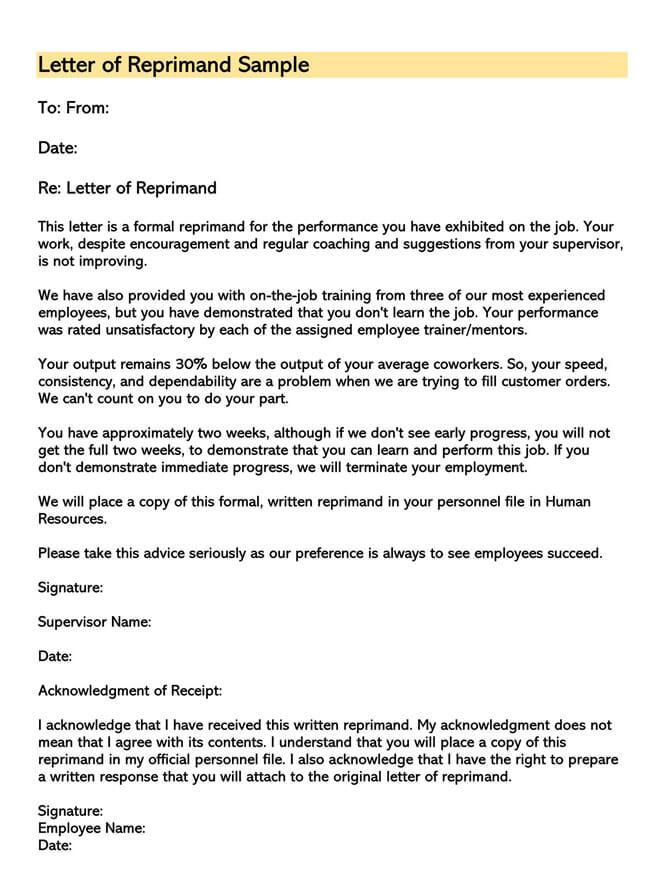
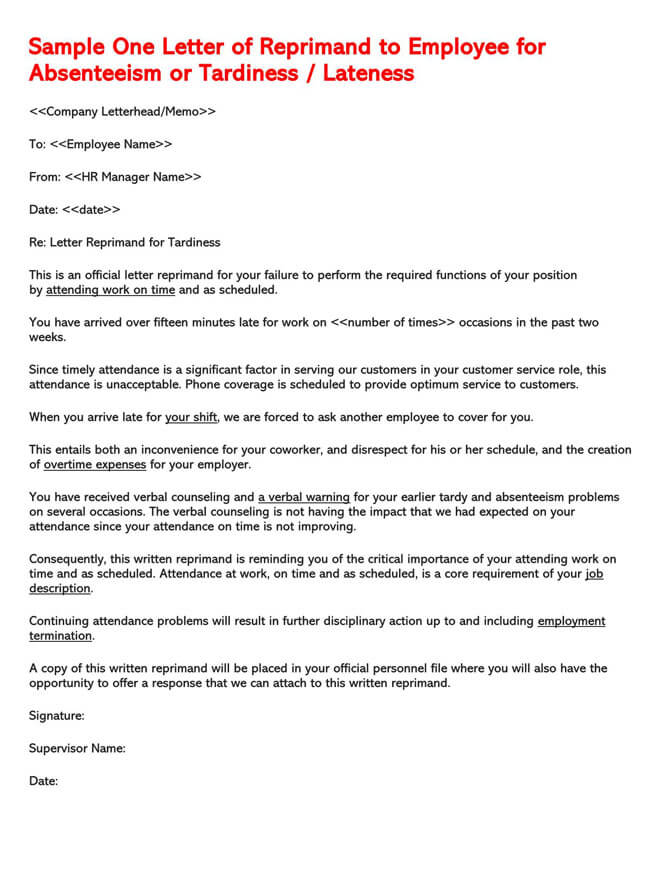
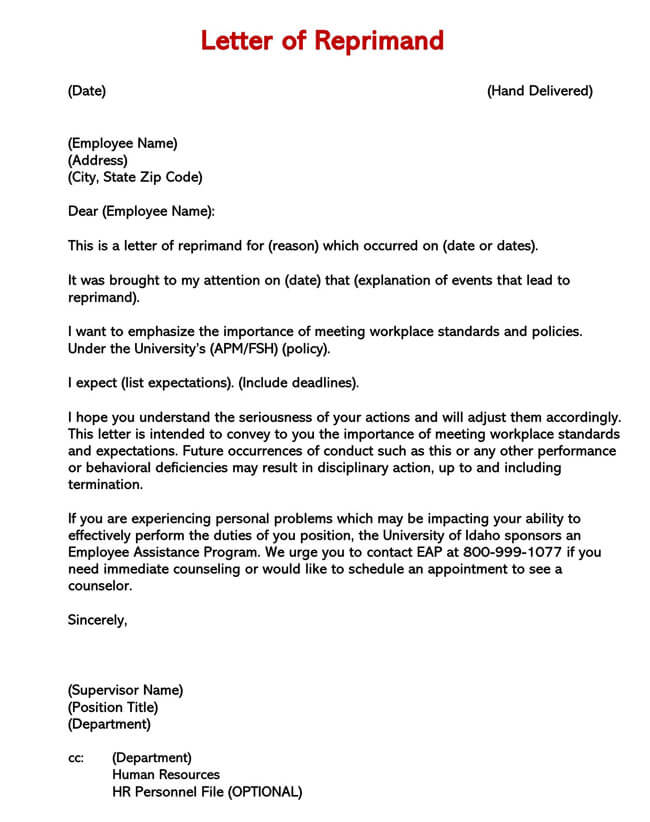
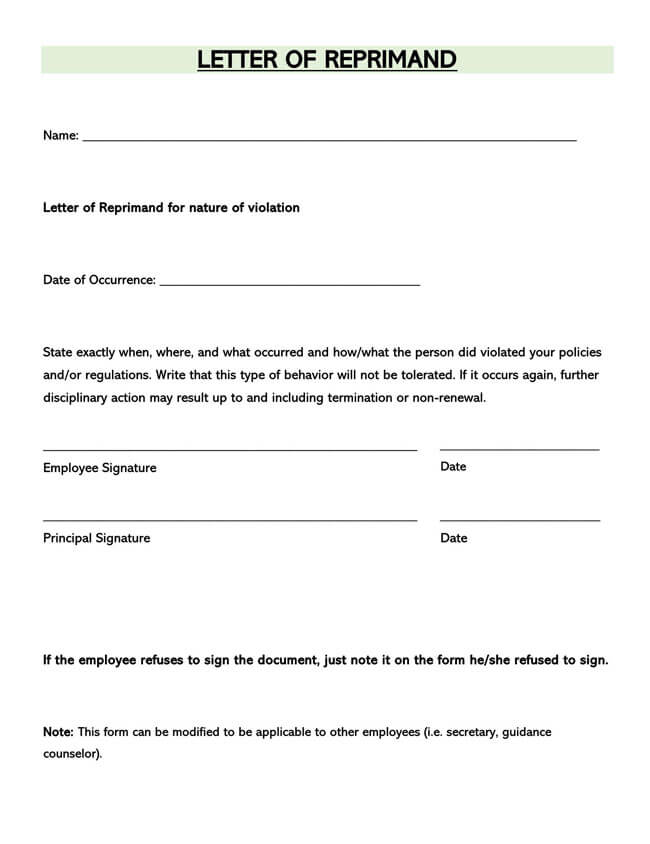
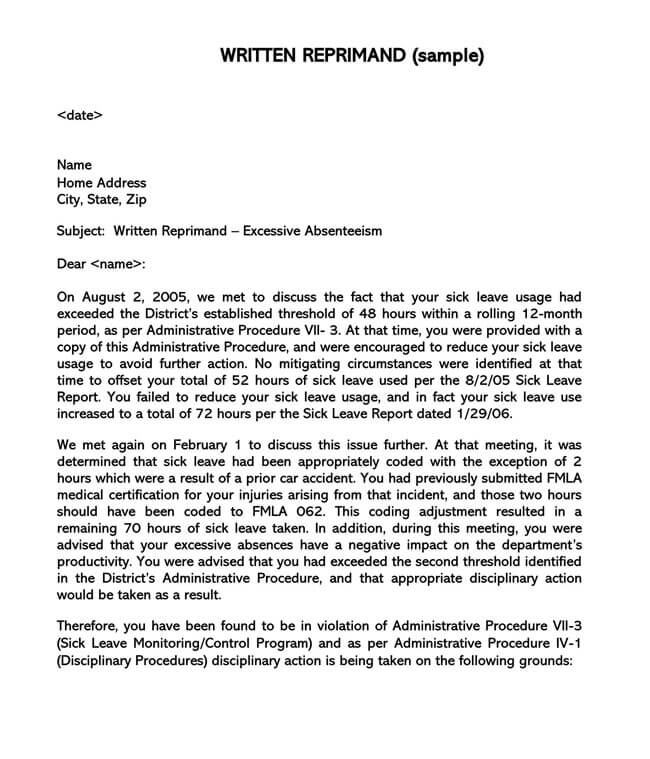
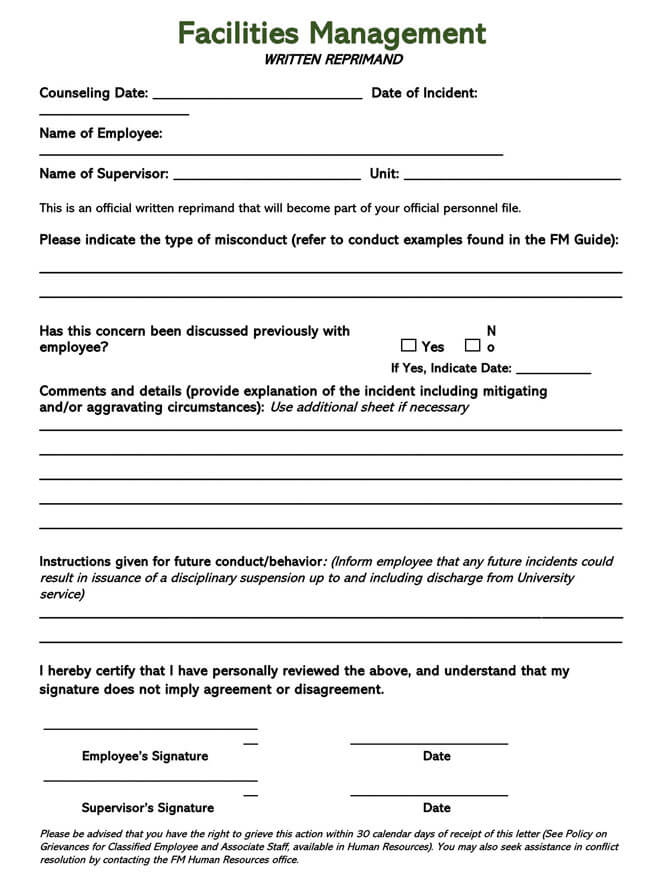
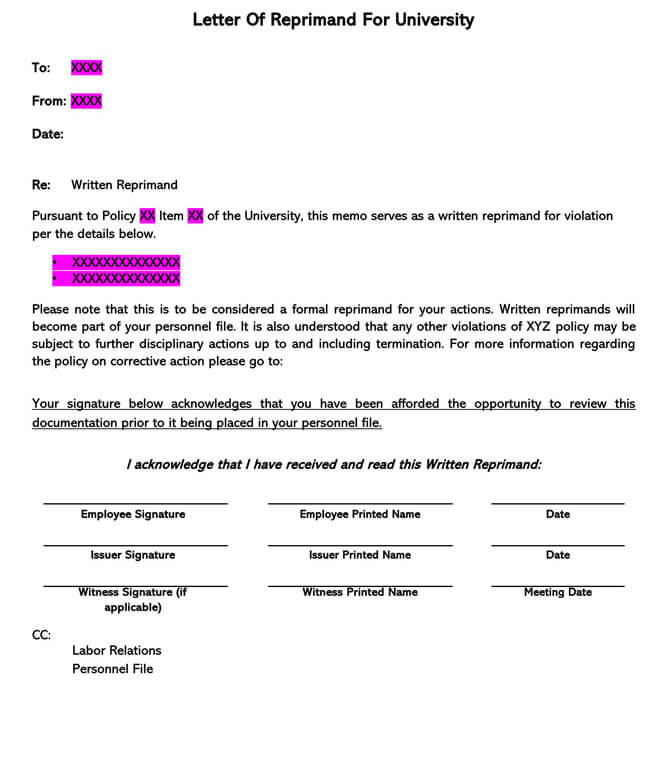
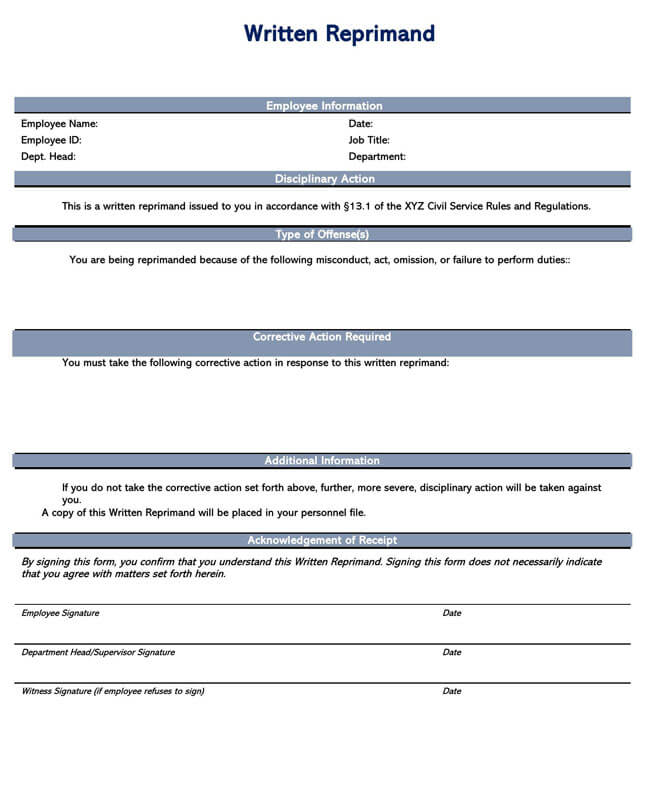
Reasons for Writing a Letter of Reprimand
A letter of reprimand as a disciplinary action
In most cases, sending a letter of reprimand is considered a disciplinary action documented to serve as a reference in the future. However, it may be an action with severe consequences, depending on the employer’s behavior.
For example, it is common for companies to allow a certain number of written reprimands before punitive actions that could affect an employee’s rank or salary.
When should I write and use a letter of reprimand?
A letter of reprimand is a formal letter that the employer should write under particular circumstances according to company policy and laws. It should not be written emotionally or anxiously, as it can later create legal issues. Employees are reprimanded depending on their performance. It is generally the responsibility of the Human Resources Department to monitor an employee’s conduct and then issue a letter to the employee if he is underperforming or engaging in unacceptable behavior.
Addressing the letter to the employee can help protect the employer against future disputes. Therefore, the letter must take the form of an official document indicating the unacceptable conduct of the employee in question. Employee deficiencies can include attendance, behavior, performance, and other issues that require attention.
Process of Writing a Letter of Reprimand
The letter of reprimand is formal and should be written clearly, highlighting the misconduct and incidents in the past with reference to the employee’s file. As mentioned above, the purpose is to increase the employee’s performance, therefore avoiding considering termination.
What follows are the processes that go into writing this letter:
Take the legal side into account
It is essential to take the legal side into account before writing a letter of reprimand. It includes making sure that it is following workplace policies and local labor laws. If the company has a progressive discipline policy, compare one’s notes from the file review to the company’s disciplinary policy. If you are a sole proprietor, you should consult your lawyer or an expert in labor law who knows about government policies to get all the legal aspects covered before issuing it.
Be objective but humane
The letter should be written by the employer formally and objectively, clearly stating the employee’s conduct or actions that are not acceptable by company policy, mainly if the employee repeats the behavior regardless of numerous verbal warnings. After the discussion is over, the employees should be asked to follow appropriate procedures. While a letter of reprimand has a negative connotation, it is still an opportunity to express your intentions elegantly and humanely. Keep in mind that the letter should help the employee personally and professionally, ensuring the continuous and smooth operation of the workforce.
Add basic details
Start with the standard details that go into a formal letter. The letter should be addressed to the employee. It should be addressed to the employee by their full name and with Mr. or Miss, if appropriate. Make sure to include the date on the letter when it was written and sent.
Highlight the problem clearly
Many professionals suggest writing about the employee’s positive traits since the letter of reprimand is written to improve the employee’s performance and is not usually written to terminate the employee. However, the content should clearly state why a letter has been issued. Keep the content short and direct.
In addition, you need to specify the specific violation or misconduct committed by the employee. Make sure you have proper documentation to support your allegation. Make sure the time and date of the violation are accurate, along with the location.
You can refer to the company policy. Use it to reinforce that the issue is not a matter of personal preference or unreasonable expectations. In addition, reference the company policy to show the employees the required behavior and parameters they must follow to conduct themselves correctly. Explain the progress the employee made following each disciplinary action, including any performance improvement plans he or she completed and any he or she still needs to complete.
Better improvement practices
In the letter, the employee could be given examples of how they can change their performance to conform to company performance expectations. The use of examples conveys a shared understanding among the employees regarding the company’s and manager’s expectations.
Explain how the employee’s non-performance impacts not only them but also the organization’s success. An employer can include a timeline in the form of a due date or an end date when the manager will evaluate the employee’s performance once again.
Describe the consequences
If an employee fails to show improvement in performance as outlined in the letter of reprimand, it should outline the consequences they can expect if they fail to do so. Provide the employee with a clear definition of the consequences should they fail to abide by the corrective actions. This act will motivate the employee even more and prove to the client that they understood what they were doing and improved themselves.
Clear employer’s actions
The employers should communicate what actions they will take in response to this behavior. It includes scheduling a private meeting with the employee and discussing the behavior or actions you wish to see them improve, or implementing an intervention plan to track this employee’s performance and behavior. It clarifies expectations for employees, and it protects your organization against legal repercussions.
Include space for signature
When reprimanding employees, the manager must sign the letter. The signature signifies that they have received the letter and that they understand its contents. The wording must be specific to indicate that they acknowledge receipt of the letter, not that they have committed misconduct.
You must remind the employee to sign the letter and let them know they have the right to submit a written response. If the employee refuses to sign, add the words “refused to sign” after his signature and ask the HR representative to sign the letter. Affixing a signature to this letter also constitutes the employee’s agreement or disagreement with its content. The signature indicates that the employee has received and read this letter.
Free Letter of Reprimand Template
[Your Name]
[Your Position]
[Company Name]
[Company Address]
[City, State, Zip Code]
[Date]
[Employee’s Name]
[Employee’s Position]
[Department]
Dear [Employee’s Name],
Subject: Formal Reprimand for [Specific Issue, e.g., Unprofessional Behavior]
This letter serves as a formal reprimand regarding the incident that occurred on [Date of Incident]. As discussed in our meeting on [Date of Meeting], your conduct of [describe the specific behavior or issue, e.g., unprofessional behavior towards a colleague] is unacceptable and violates our company policies, specifically [mention relevant company policy or code of conduct].
Details of the Incident:
- [Provide a clear and concise description of the incident or behavior.]
- [Explain how this behavior is detrimental to the team, department, or company.]
The purpose of this reprimand is not only to address the issue but also to emphasize the seriousness of your actions and the impact they have on the team and the company. It is imperative that you understand the consequences of such behavior and the importance of adhering to company policies and standards.
Expected Behavior and Improvement:
- Going forward, we expect [describe the expected behavior, e.g., professional conduct and respectful communication with all colleagues].
- [If applicable, include any specific actions the employee is required to take, such as attending a training session or workshop.]
Consequences of Further Violations:
- Please be aware that any further violations of company policy may result in additional disciplinary action, up to and including termination of employment.
We value your contributions to the team and believe in your potential to rectify this situation. We expect to see immediate improvement in your behavior. If you have any questions or need clarification on any of the points mentioned in this letter, please do not hesitate to reach out to me or [Human Resources/Relevant Department].
Sincerely,
[Your Full Name]
[Your Position]
[Company Name]
Sample Letters of Reprimand
Sample 01: Habitual absenteeism sample
Dear Mr. Doe,
Subject: Formal Reprimand for Habitual Absenteeism
This letter serves as a formal reprimand regarding your habitual absenteeism, which has been noted and documented over the past several months. As per our records, you have been absent without proper notification or acceptable reason on multiple occasions, most recently on January 25, 26, and 27, 20XX. This pattern of unexplained absences is a violation of our company’s attendance policy, as outlined in the Employee Handbook.
Your frequent absences have disrupted the workflow of the Sales Department, placing additional burdens on your colleagues. The lack of prior notification has hindered our ability to arrange adequate coverage, affecting our team’s overall performance and client relations.
We have previously discussed the importance of regular attendance and punctuality in our meeting on December 15, 20XX. Despite this, there has been no noticeable improvement in your attendance record.
We expect an immediate improvement in your attendance record is required and all absences must be reported in accordance with company policy, with appropriate documentation provided where necessary.
Please be advised that continued unexplained or frequent absences may result in further disciplinary action, up to and including termination of employment.
We value your contributions to the Sales Department and believe that you can make the necessary improvements. We encourage you to utilize the resources available, such as speaking with your supervisor or Human Resources if there are underlying issues contributing to your absenteeism.
Please acknowledge receipt of this letter and your understanding of its contents by signing and returning the attached copy. If you have any questions or wish to discuss this matter further, please do not hesitate to contact me.
Sincerely,
Jane Smith
Human Resources Manager
XYZ Corporation
Sample 02: Poor performance
Dear Ms. Johnson,
Formal Reprimand for Poor Performance
I am writing to address a serious concern regarding your performance as a Quality Control Analyst in the Quality Assurance Department. Over the past three months, there have been multiple instances where your work has not met the standards and expectations set forth by ABC Manufacturing Inc.
The specific performance issues that have been noted are as follows:
- Inconsistencies in quality checks, as evidenced in the reports dated December 5, 20XX, and January 10, 20XX.
- Failure to adhere to established protocols leading to a 20% increase in product defects for the last quarter.
- Repeated missed deadlines, notably on the critical project due on January 15, 20XX.
These issues have had a significant impact on the department’s efficiency and the overall product quality, leading to customer complaints and a tarnished reputation for the company.
We have discussed these concerns in our performance reviews on November 20, 20XX, and again on January 5, 20XX.
Despite verbal warnings and the provision of additional training, there has been no noticeable improvement in your performance.
We anticipate an immediate and sustained improvement in your performance. Furthermore, you are expected to adhere strictly to all quality control protocols and deadlines.
A Performance Improvement Plan (PIP) will be implemented, outlining specific goals and actions to be taken. This plan will be reviewed weekly to monitor progress.
Failure to improve your performance as outlined in the PIP may result in further disciplinary action, up to and including termination of employment.
We recognize your potential and the contributions you have made in the past. It is our hope that you will take this reprimand seriously and make the necessary improvements. Please feel free to reach out to me or the Human Resources department if you require support or clarification regarding this matter.
Please acknowledge receipt of this letter and your commitment to the improvement plan by signing and returning the attached copy.
Sincerely,
Michael Thompson
Director of Operations
ABC Manufacturing Inc.
Sample 03: Failure to comply with policies
Dear Mr. Lee,
Subject: Formal Reprimand for Non-Compliance with Company Policies
This letter serves as a formal reprimand for your failure to comply with the established policies of Tech Solutions Inc., as detailed in our Employee Handbook. Specifically, this pertains to your repeated violations of our company’s internet usage policy and the code of conduct regarding workplace behavior.
On several occasions, most recently on January 22 and 24, 20XX, you were found using company-provided internet access for personal activities, which is in direct violation of our policy on acceptable use of company resources.
Additionally, there have been two incidents reported on January 15 and 18, 20XX, where your interactions with team members were deemed unprofessional and contrary to our workplace conduct standards.
These actions are concerning as they not only breach our company policies but also set a negative example for your colleagues and potentially impact the productivity and harmony of the workplace.
We have addressed these issues in our previous meetings, specifically on December 10, 20XX, and January 5, 20XX.
Despite these discussions and your acknowledgment of understanding the policies, there has been a continued pattern of non-compliance.
Immediate adherence to all company policies is required. You are expected to review the Employee Handbook and re-familiarize yourself with our policies, particularly those regarding internet usage and professional conduct in the workplace.
Please be advised that any further instances of policy violation may result in more severe disciplinary action, including the possibility of termination.
We value your technical skills and contributions to the Software Development Department and hope that this reprimand will serve as a reminder of the importance of adhering to our company policies. We trust that you will take this matter seriously and make the necessary adjustments to your behavior.
Please sign and return the attached acknowledgment form to confirm your understanding of this reprimand and your commitment to adhere to company policies henceforth.
If you have any questions or need further clarification, please feel free to contact me directly.
Sincerely,
Elizabeth Martinez
Human Resources Director
Tech Solutions Inc.
Things to Avoid
Do not sound like an angry parent rebuking the employee as a child. Instead, write down the rectification measures that the employee must follow to ensure that he or she can realize the violation that one has committed and how he or she can improve per the standards established by the company.
To avoid any legal problems, you may attach an employee’s attendance records or a performance review when there has been poor performance or productivity as evidence of the claim made against him or her.
Be in place of the employee
Keep the purpose of the letter in mind and write it from a perspective that helps achieve the purpose by putting yourself in the employee’s shoes.
A letter of reprimand is written from the employer to the employee, informing the latter of his failure to comply with the company policy. What follows will guide you through the reasons for writing one.
Violation of company’s policies
The ways an employee can violate company policy include attendance, behavior, performance, and other issues requiring attention.
Below are the most common reasons that may result in the issuance of such a letter:
- Breach of employee obligations.
- Violation of health and safety policy
- Violation of alcohol and drugs policy
- Theft of company property
- Frequent tardiness
- Absenteeism
- Violation of confidentiality policy
Things to be considered inappropriate
There are some specific things and behaviors that should not be tolerated or considered acceptable in a workplace. A letter of reprimand can be for insubordination, which involves intentionally refusing to follow directions from management or company officials; unnecessary arguments, misconduct with coworkers, or underperformance involves failure to meet minimum standards of the position and job requirements for a probationary period.
Tips to Consider in Managing Behaviors
A productive and successful workplace depends on good behavior. For organizations to succeed, employees’ behavior must be in line with what the organization needs. Changing behavior in the workplace is not an easy task.
There are at least a few “tried and true” methods to get it done. Here are a few tips to keep in mind:
Considering office-based policies
According to the workplace’s terms, a dedicated human resource department handles and amends the policies and policy handbook according to the workplace’s terms in large companies. However, small businesses should also create a company policy.
Company policies address both inside and outside the workplace and are usually contained within a business’s employee handbook. They apply to both employees and employers. Employee motivation and engagement can be vital to driving your company’s success. Favorable company policies can reinforce these factors and help your company thrive, especially if you are just getting started.
Maintaining progressive discipline
A progressive discipline process is used when employees fail to demonstrate behavior that corresponds to their expected and communicated performance standards. Progressive discipline is designed to help individuals understand that there is a performance problem or opportunity to improve.
Contrary to the old notion that discipline is punishment, it is a series of tactics to give the employee feedback to improve. It involves telling the employee verbally that he will be shown how to improve his performance despite repeated warnings and that he will have to document the changes.
Continuous policy implementation
The most important thing for the success of a company’s workplace and disciplinary policy is consistent application. Employers who selectively enforce workplace policies are likely to lose employees due to substantial turnover owing to low morale and general dissatisfaction.
In addition, reprimands need to be consistent in their content and actions. Employees are exposed to potential legal liability when they complain about unfair treatment if their employers cannot enforce policies consistently. For large companies, applying a consistent policy is not an easy task, and it’s the HR department that has to overlook it; however, it is much easier to maintain a consistent policy in small companies.
Develop a verbal route
Giving a verbal warning is always advised before issuing a formal letter of reprimand. It is considered standard practice, which involves informing the employees that they might face further consequences if they don’t improve their behavior or performance in the workplace. The consequences can vary depending on the severity of the misconduct and may include demotion or termination. It is also advised to document the verbal warning for later references in the demotion or termination letter, and it may also be helpful in a lawsuit.
Issuing a termination
If the employee is still misconducting after the verbal warning and the written reprimand or cannot increase his performance, it’s okay to terminate the employee. However, he should be given enough time after sending the letter, and only after that should his employment be terminated.
Frequently Asked Questions
A written reprimand is often used after previous written, or verbal warnings do not result in the desired results. With the written reprimand, the issue is placed in the employee’s personnel file and kept for a predetermined amount of time.
How long a letter of reprimand stays on the file depends on the company policy; however, in most cases, it’s between 6 months and a year.












